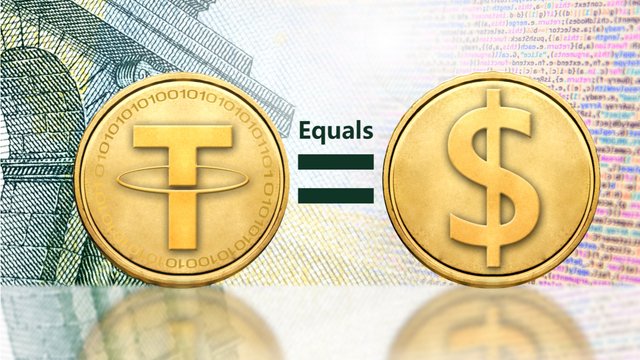Proclaimed by Business Insider as the "cryptocurrency that people worry could crash Bitcoin and that regulators are investigating," Tether already has quite the reputation behind it, burgeoning though it may be. Founded in 2015 under the name Realcoin, Tether is a digital form of money designed to reap the benefits of both blockchain technology and traditional currency, by virtue of the Tether platform (which leverages the security and transparency of the blockchain) and being "100 percent backed" by currencies in their reserves:
"Every tether is always backed one-to-one by traditional currency held in our reserves. So 1 USD₮ is always equivalent to 1 USD."

This, Tether's founders say, makes it a stable currency equivalent to the U.S. dollar, Euro or Yen. To their credit, since 2015, the value has held stable around the $1.00 mark with only minor fluctuations. At present, Tether has a market cap of about $2,223,947,436, or 217,852 BTC, with a 24-hour volume of $2,365,420,000 and a circulating supply of 2,217,140,814 USDT. Tether publishes their reserve holdings daily and says they undergo frequent audits to ensure that their in-circulation currency always matches their reserves. It's an interesting concept and has deservedly generated quite the recent buzz.
Tether: Competition, Pros and Cons
Tether claims they are providing a more modern approach to money. They see the advantages of cryptocurrency -- low transaction costs, international borderless transferability/convertibility, trustless ownership/exchange, pseudo-anonymity, real-time transparency, and immunity from legacy banking system issues -- but note that cryptocurrency has yet to see widespread adoption.
The issue, they posit, is that most cryptocurrencies have drawbacks of their own that limit their use in the mainstream, including "volatile price swings, inadequate mass-market understanding of the technology, and insufficient ease-of-use for non-technical users. What Tether seeks to implement is a bridge to the gap, one that will connect the average individual with the powers afforded by blockchain technology. According to the whitepaper:
"Each tether unit issued into circulation is backed in a one-to-one ratio by the corresponding fiat currency unit held in deposit by Hong Kong-based Tether Limited. Tethers may be redeemable/exchangeable for the underlying fiat currency pursuant to Tether Limited's terms of service or, if the holder prefers, the equivalent spot value in Bitcoin."
From this system, users enjoy many benefits, as explained by Tether. The cryptocurrency exists on Bitcoin's blockchain, as opposed to less tested systems, offering a proven and secure platform. Tethers can be used exactly like Bitcoins (peer-to-peer, pseudo-anonymous, decentralized, etc.) and are capable of similar transactions.
Tether also claims to shield users from undue market risks (a feature of being tied to fiat currency), and makes the entire concept of digital currency more easy to comprehend for less tech-savvy individuals. The process is as simple as signing up for an account, adding currency to a wallet, then storing and spending that currency as desired. The possibilities, for both businesses and users, they state, are unlimited:
"Tether enables businesses - including exchanges, wallets, payment processors, financial services and ATMs - to easily use fiat-backed tokens on blockchains. By leveraging blockchain technology, Tether allows you to store, send and receive digital tokens person-to-person, globally, instantly and securely for a fraction of the cost of alternatives."
A rosy picture, but the platform is not without criticism. For instance, the Business Insider article cited earlier claims that there mounting fear among cryptocurrency communities at large that Tether doesn't have the reserves necessary to back their currency as they profess. They cite a prominent naysayer, also reported on by the New York Times, who has published numerous essays under the handle Bitfinex'ed detailing what they see as trickery on behalf of Tether Limited.
Tether denies the allegations, which have done little to shake its value or diminish its market cap. In fact, the market cap for Tether has risen sharply since the beginning of 2018, with more and more prospective users interested in what the company has to offer. Still, accusations like these may give pause to those who might be on the fence, and raise questions about whether Tether's auditing process is as thorough as they claim. This year may well be a test for their vision, and provide insights as to the viability of the company's core idea.

The Uses of Tether
The concept of Tether is a simple one to grasp: digital money that can be used for various transactions. On their website, they lay out several use examples for blockchain companies, exchanges, individuals and traders. These include bypassing traditional financial institutions to reduce operating costs, using Tether as an alternative to for deposits and withdrawals on exchanges, and providing a means to move currency globally and without the hassle of banks.
The Future for Tether
Tether keeps users abreast of their progress through their announcements page, which details recent and upcoming news regarding the platform. They've performed an update to their wallet service along with general platform updates, and have announced that both USD and Euro-based Tether currency are now supported on Ethereum.
Fears of "crashing the price of Bitcoin" and hampering the future of cryptocurrency don't seem to have dampened their spirits, nor has a recent security incident which saw some of their services go down temporarily. If all goes according to plan, they'll be working to improve their system and branch the adoption of Tether to even more networks throughout the year and beyond.
Sources:
- https://coinmarketcap.com/currencies/tether/
- https://tether.to/
- https://tether.to/faqs/
- https://tether.to/wp-content/uploads/2016/06/TetherWhitePaper.pdf
- https://tether.to/why-use-tether/
- https://tether.to/tether-for-individuals/
- https://tether.to/about-us/
- https://tether.to/category/announcements/
- http://www.businessinsider.com/tether-explained-bitcoin-cryptocurrency-why-people-worried-2018-1
- https://medium.com/@bitfinexed
Downvoting a post can decrease pending rewards and make it less visible. Common reasons:
Submit